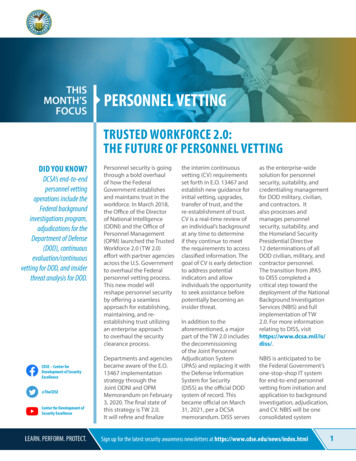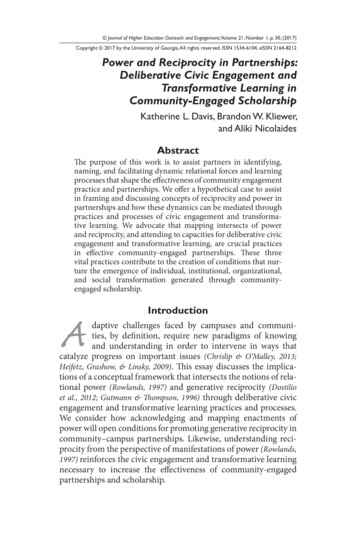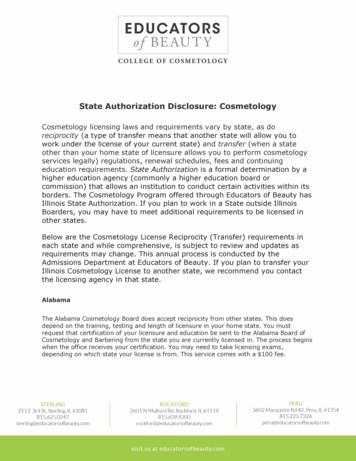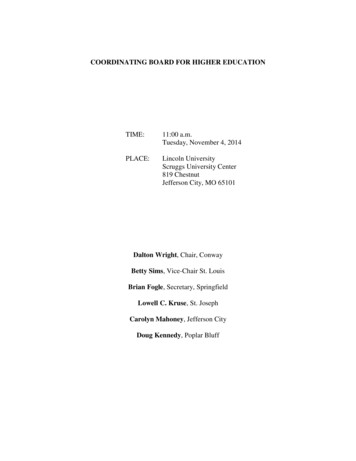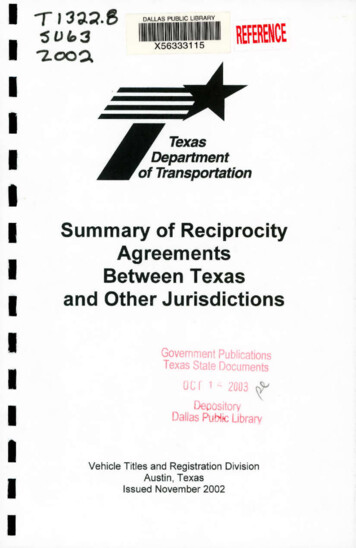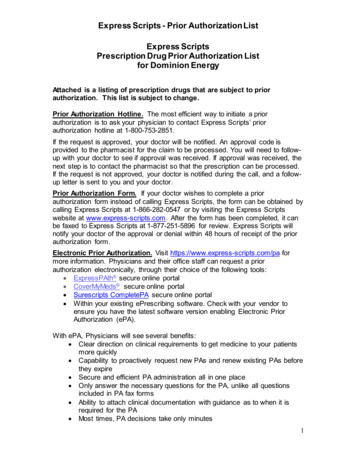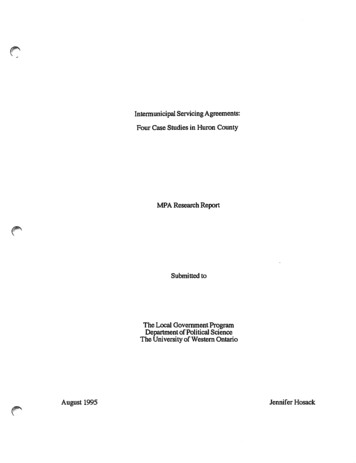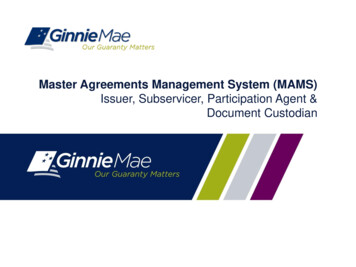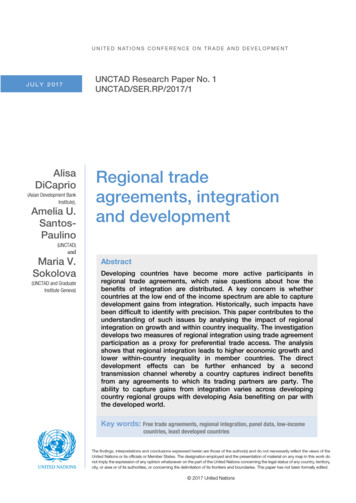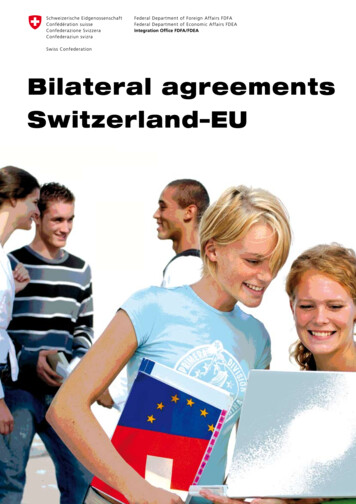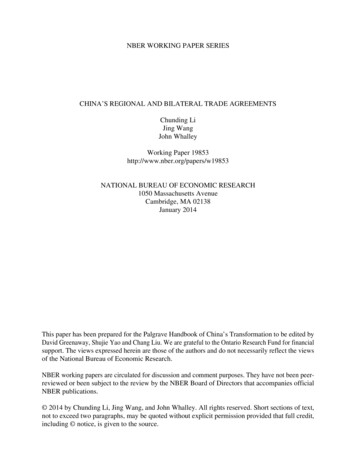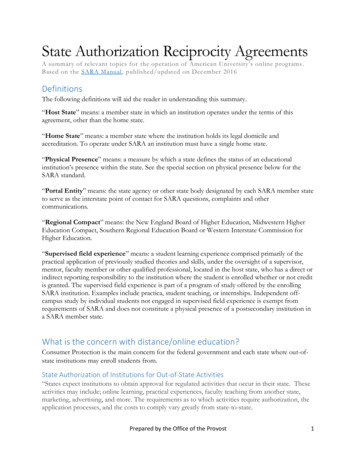
Transcription
State Authorization Reciprocity AgreementsA summary of relevant topics for the operation of American University’s online programs .Based on the SARA Manual, published/updated on December 2016DefinitionsThe following definitions will aid the reader in understanding this summary.“Host State” means: a member state in which an institution operates under the terms of thisagreement, other than the home state.“Home State” means: a member state where the institution holds its legal domicile andaccreditation. To operate under SARA an institution must have a single home state.“Physical Presence” means: a measure by which a state defines the status of an educationalinstitution’s presence within the state. See the special section on physical presence below for theSARA standard.“Portal Entity” means: the state agency or other state body designated by each SARA member stateto serve as the interstate point of contact for SARA questions, complaints and othercommunications.“Regional Compact” means: the New England Board of Higher Education, Midwestern HigherEducation Compact, Southern Regional Education Board or Western Interstate Commission forHigher Education.“Supervised field experience” means: a student learning experience comprised primarily of thepractical application of previously studied theories and skills, under the oversight of a supervisor,mentor, faculty member or other qualified professional, located in the host state, who has a direct orindirect reporting responsibility to the institution where the student is enrolled whether or not creditis granted. The supervised field experience is part of a program of study offered by the enrollingSARA institution. Examples include practica, student teaching, or internships. Independent offcampus study by individual students not engaged in supervised field experience is exempt fromrequirements of SARA and does not constitute a physical presence of a postsecondary institution ina SARA member state.What is the concern with distance/online education?Consumer Protection is the main concern for the federal government and each state where out-ofstate institutions may enroll students from.State Authorization of Institutions for Out-of-State Activities“States expect institutions to obtain approval for regulated activities that occur in their state. Theseactivities may include; online learning, practical experiences, faculty teaching from another state,marketing, advertising, and more. The requirements as to which activities require authorization, theapplication processes, and the costs to comply vary greatly from state-to-state.Prepared by the Office of the Provost1
In 2010, the U.S. Department of Education issued a regulation tying an institution's ability to offerfederal financial aid in a state to the institution being authorized in the student's state. Theregulation, 34 CFR 600.9 (c), was subsequently "vacated" by federal court ruling and thereforeunenforceable. Regardless of the status of the federal regulation, institutions are legally obligated tocomply with the laws and regulations of the states where the institution participates in regulatedactivities1”What is SARA?State Authorization Reciprocity Agreements (SARA) pertains to approval of distance educationcourses and programs offered across state lines by postsecondary institutions that already havedegree authorization in at least one state. SARA centralizes the authorization process for eachinstitution in a single state called the institution’s “home state.” Colleges or universities in a SARAstate therefore only need their home state authorization to offer distance education to students inany other SARA member state, subject to certain limitations. The District of Columbia is the “homestate” and it belongs to the Southern Regional Education Board (SREB) regional compact.What problem does SARA solve for American University?SARA simplifies the process by making state authorization: more efficient, effective, and uniform in regard to necessary and reasonable standards ofpractice that could span states;more effective in dealing with quality and integrity issues that have arisen in some online/distance education offerings; andless costly for states and institutions and, thereby, the students they serve.American University was granted SARA membership in November, 2016 which authorizes theuniversity to offer distance education programs to almost all states (view member states). Thefollowing states are not part of SARA: California and Massachusetts. American University obtainsauthorizations/exemptions from these states individually.SARA Membership ResponsibilitiesAmerican University must abide by the Unified State Authorization Reciprocity Agreement (ViewAgreement). This agreement addresses one of the main concerns that federal and state agencies haveregarding distance education, Consumer Protection. For convenience, key aspects of this agreementare included throughout this document.Summary of responsibilities-1Meet C-RAC norms; “C-RAC” refers to the Interregional Guidelines for the Evaluation ofDistance Education Programs (Online Learning) for best practices in postsecondary distanceeducation developed by leading practitioners of distance education and adopted by theCouncil of Regional Accrediting Commissions (C-RAC).Annual enrollment report submissionPayment of membership egulation/state-authorizationPrepared by the Office of the Provost2
-Resolution student complaintsMonitoring online programs operations to ensure compliance with SARA Agreement(Consumer Protection issues).The Role of DC Portal Agency under SARAThe District of Columbia is the “home state” for American University. The designated portal agencyis the DC Higher Education Licensure Commission.SARA consumer protection provisions require the home state, through its SARA “portal” entity, toinvestigate and resolve allegations of dishonest or fraudulent activity by a provider, including theprovision of false or misleading information.The portal entity has the following duties:1. Serve as the point of contact for all other SARA member states and their agencies forquestions about SARA within its state;2. Serve as initial point of contact for institutions within its state that have questions aboutSARA;3. Determine whether an institution in its state is eligible for participation in SARA;4. Serve as the initial contact point for complaints about any institutions in the state thatare operating under SARA and lead any investigations regarding whether an institution isin compliance with SARA rules and policies;5. Collect and manage any in-state fees assessed on participating institutions for oversightof SARA.SARA member states continue to have authority to enforce all their general-purpose laws2 againstnon-domestic institutions (including SARA participating institutions) providing distance educationin the state, including, but not limited to, those laws related to consumer protection and fraudulentactivities.Examples of Consumer Protection IssuesExamples of issues that may arise in regard to alleged fraudulent activity or more general complaintsinclude, but are not limited to:a. Veracity of recruitment and marketing materials;b. Accuracy of job placement data;c. Accuracy of information about tuition, fees and financial aid;d. Complete and accurate admission requirements for courses and programs;e. Accuracy of information about the institution’s accreditation and/or anyprogrammatic/specialized accreditation held by the institution’s programs;f. Accuracy of information about whether course work meets any relevant professionallicensing requirements or the requirements of specialized accrediting bodies;g. Accuracy of information about whether the institution’s course work will transfer to otherinstitutions; and2A “general-purpose law” is one that applies to all entities doing business in the state, not just institutions ofhigher education.Prepared by the Office of the Provost3
h. Operation of distance education programs consistent with practices expected byinstitutional accreditors (and, if applicable, programmatic/specialized accreditors) and/or theC-RAC Guidelines for distance education.Responsibilities for resolving complaints.Initial responsibility for the investigation and resolution of complaints resides with the institutionagainst which the complaint is made. Further consideration and resolution, if necessary, is theresponsibility of the SARA portal entity, and other responsible agencies of the institution’s homestate (see the following section: Complaint Resolution Processes).The portal entity is responsible for staffing the investigation and resolution of complaints that arenot resolved at the institutional level.Institutions operating under SARA shall provide their and SARA’s complaint resolution policies andprocedures to all students taking courses under SARA provisions.How does SARA cover American University’s Online Programs?SARA applies solely to distance education activity conducted across state lines. It does not apply todistance education activity inside a state or to on-ground campuses. For purposes of SARA,“distance education” includes a limited number of group activities conducted for short periods onthe ground.Programs leading to Professional LicensureSARA has no effect on state professional licensing requirements. Any institution operating underSARA that offers courses or programs potentially leading to professional licensure must keep allstudents, applicants and potential students who have contacted the institution about the course orprogram informed as to whether such offerings actually meet state licensing requirements.Short courses and seminarsPhysical presence under SARA is not triggered if the instruction provided for a short course orseminar takes no more than 20 classroom hours in one six-month period. Class meetings during afull-term course do not trigger physical presence if the instructor and students physically meettogether for no more than two meetings, totaling less than six hours. Apparent abuses of theseprovisions may be brought to the attention of the home state.American University and Physical Presence in StatesAll of American University’s online programs do not have physical presence in any state. Under theSARA agreement the following activities are allowed under our membership.An institution that does not have physical presence, and is therefore covered by SARA in SARAmember states, if it is only:1. Offering courses to individuals via distance education in ways that do not require students togather physically in groups, excepting the special provisions in Section 5 of the Manual;2. Advertising to students whether through print, billboard, direct mail, internet, radio,television or other medium;3. Offering distance education courses on a military base or vessel if enrollment in such coursesis limited to active and reserve military personnel, their dependents, and civilian employeesof the installation;Prepared by the Office of the Provost4
4. Maintaining a server, router or similar electronic service device housed in a facility thatotherwise would not constitute physical presence (the presence of a server or similar passthrough switching device does not by itself constitute the offering of a course or program inthat state);5. Having faculty, adjunct faculty, mentors, tutors, recruiters or other academic personnelresiding in a member state and working from their homes or another private, noninstitutional site, provided that such staff is not engaged in activities that would otherwiseconstitute physical presence as defined by these Policies and Standards;6. Holding proctored exams on behalf of the institution in the host state;7. Having contractual arrangements in the home or host state, e.g. procurement contracts orcourse offerings through consortium agreements;8. Operating limited supervised field experiences (See subsection 5.13 in the Manual);9. Using recruiters in a SARA member state. This provision is not restricted to recruiting forcourses or programs offered under SARA, and does include athletic recruiting.10. Engaging in field trips to visit existing sites or facilities for academic purposes not involvingthe establishment of residential or instructional facilities.Supervised Field Experiences- a. If the host state requires approval of supervised field experiences by agencies or boardsresponsible for professional requirements in fields requiring licensure or certification forpractice, such professional approval requirements remain in effect.- b. Supervised field experiences, except for requirements of professional licensing entities asnoted in “a" above, and subject to the following limitations, do not establish a physicalpresence under SARA and are therefore covered by the provisions of SARA governinginterstate distance education activity, whether the field experience is part of a distanceeducation or campus-based program.- c. Existing contracts among provider institutions and sites used for supervised fieldexperiences as of the date that an institution begins participating in SARA are not impaired,revised or otherwise affected by SARA. At the time that any provision of such a contract ischanged, the new contract must comply with SARA policies and standards set forth herein.-d. A contract for supervised field experiences to be covered by SARA is limited as follows.Such a contract:1. Cannot provide for the placement of more than ten students from an individualacademic program placed simultaneously at one clinical or practicum site, unlessapproval for a larger number is provided by the host state SARA portal entity.2. May be objected to by the host state portal entity on grounds that the institutionhas:i. a demonstrable failure to achieve an acceptable professional licensing ratein the host state if the program customarily leads to licensure, provided that theacceptable rate is not higher than the lower of (a) the lowest rate of a host statebased institution in good standing or (b) the average state licensure rate, orii. an unreasonable number of valid, documented complaints about programoperation or quality which have not been adequately resolved by the institution.3. If a host state objects to a supervised field experience or clinical placement underSARA on the grounds set forth in subsection (2) above, the affected regionalPrepared by the Office of the Provost5
compact(s) shall determine whether the placement is allowable under SARA, usingprocedures to be developed for that purpose.i. Any student enrolled in an academic program prior to the time theinstitution begins operations under SARA may remain in any supervised fieldexperience site to which the student is assigned, irrespective of SARA policies.ii. An institution operating under SARA that owns a supervised fieldexperience, clinical or practicum site is not subject to the limitations of subsection (d)on placement of its own students at such a site.iii. SARA policies and standards regarding supervised field experiences donot supersede, replace or modify any federal law that would affect students placedunder SARA. SARA policies are subsidiary to any such federal laws covering thesame subjectsStudent mobilityLocation of student1. Educational activity under SARA is deemed to occur where the student is physically locatedat the time the student is in contact with the educational provider or a contractor acting onbehalf of the provider.2. The student’s legal state of residence is not a factor in determining physical location forpurposes of SARA.3. The fact that the student moved involuntarily (for example owing to service in the militaryor incarceration) is irrelevant to a determination of location for purposes of subsection (1)above.Prepared by the Office of the Provost6
responsible for professional requirements in fields requiring licensure or certification for practice, such professional approval requirements remain in effect. - b. Supervised field experiences, except for requirements of professional licensing entities as noted in "a" above, and subject to the following limitations, do not establish a physical
